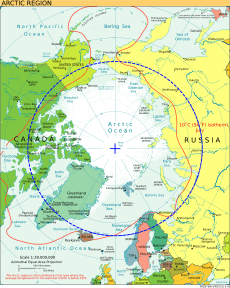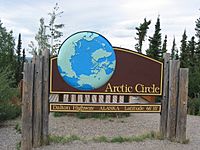Arctic Alaska facts for kids


Arctic Alaska, also known as Far North Alaska, is a special part of the U.S. state of Alaska. It covers the northern areas that are close to the Arctic Ocean.
This region includes places like North Slope Borough and Northwest Arctic Borough. Sometimes, parts of the Yukon-Koyukuk Census Area are also considered part of Arctic Alaska. Some well-known towns here are Prudhoe Bay, Utqiaġvik, Kotzebue, Nome, and Galena. Not all of these towns are exactly inside the Arctic Circle.
Most communities in Arctic Alaska do not have highways. People usually travel there by aircraft or snowmobile when the weather is good. Long ago, different Alaska Native groups lived here. They hunted, fished for salmon, and went whaling. Later, people came to Arctic Alaska because they found gold. Even later, they came to get petroleum (oil).
Nature and Wildlife in Arctic Alaska
The natural world in Arctic Alaska is mostly tundra. Tundra is a type of land where the ground is frozen most of the time, and only small plants grow. This area has mountain ranges and flat coastal plains. Many animals live here, like bears, wolves, sheep, muskoxen, and caribou. You can also find many different species of birds. The northern coast is known as the Arctic coastal tundra.
Arctic Alaska is also home to several important natural areas. These include the Arctic National Wildlife Refuge, Gates of the Arctic National Park and Preserve, Kobuk Valley National Park, and the National Petroleum Reserve–Alaska. These places help protect the unique wildlife and landscapes.
Amazing Arctic Sky
In the summer, the Arctic experiences the midnight sun. This means the sun stays visible for 24 hours a day! In the winter, it's the opposite. The region has a polar night, where the sun does not rise for a long time.
Arctic Climate
Most of northern Alaska has an Arctic climate. This means the winters are very long and extremely cold. The summers are short and cool. During the summer months, the average temperatures are only a few degrees above freezing. In winter, the average temperatures can drop to about -20 to -30 degrees Fahrenheit. Sometimes, they can even go as low as -50 to -60 degrees Fahrenheit!
See also
 In Spanish: Alaska septentrional para niños
In Spanish: Alaska septentrional para niños
 | Lonnie Johnson |
 | Granville Woods |
 | Lewis Howard Latimer |
 | James West |

